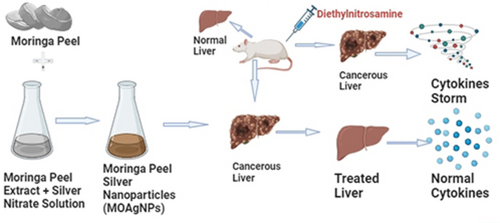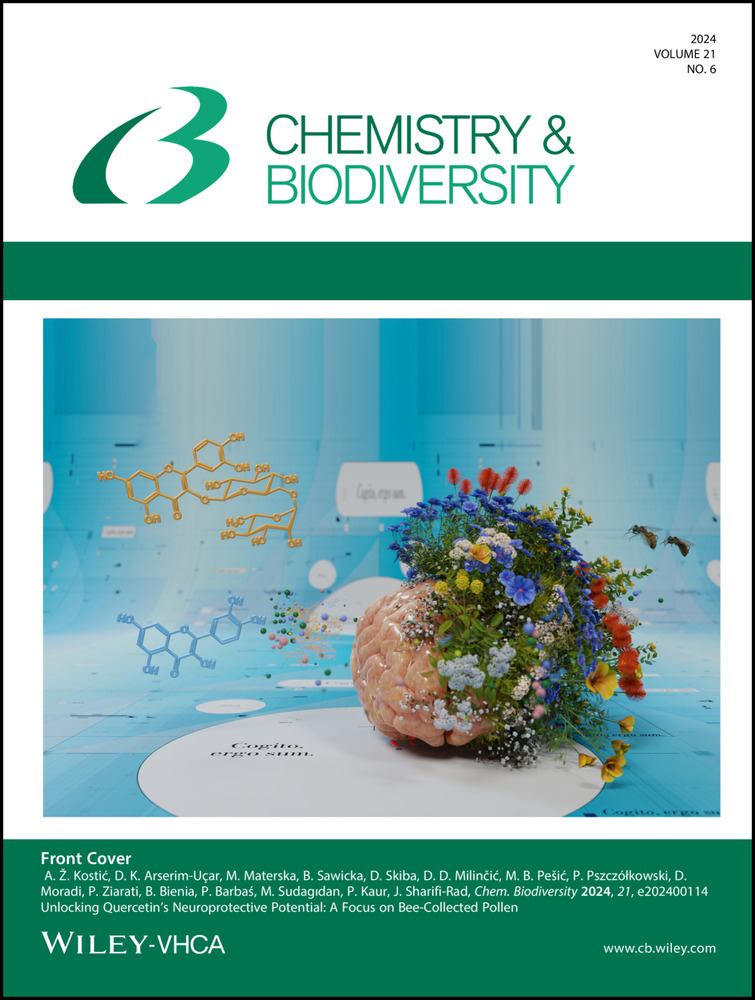Phyto-Fabrication of Moringa Oleifera Peel-Sourced Silver Nanoparticles: A Promising Approach for Combating Hepatic Cancer by Targeting Proinflammatory Cytokines and Mitigating Cytokine Storms
Shahnawaz Sameem
Bioorganic and Medicinal Chemistry Research Laboratory, Department of Pharmaceutical Sciences, Sam Higginbottom University of Agriculture, Technology and Sciences, Prayagraj, 211007 India
Contribution: Conceptualization (equal), Formal analysis (lead), Investigation (lead), Methodology (lead), Writing - original draft (lead), Writing - review & editing (supporting)
Search for more papers by this authorVivek Dwivedi
Bioorganic and Medicinal Chemistry Research Laboratory, Department of Pharmaceutical Sciences, Sam Higginbottom University of Agriculture, Technology and Sciences, Prayagraj, 211007 India
Contribution: Conceptualization (equal), Data curation (equal)
Search for more papers by this authorVikas Kumar
Natural Product Drug Discovery Laboratory, Department of Pharmaceutical Sciences, Sam Higginbottom University of Agriculture, Technology and Sciences, Prayagraj, 211007 India
Contribution: Conceptualization (lead), Formal analysis (equal), Methodology (equal)
Search for more papers by this authorAshish R. Dwivedi
Department of Medicinal Chemistry, School of Pharmacy, GITAM (Deemed to be University), Hyderabad Campus, 502329 India
Contribution: Data curation (equal), Formal analysis (equal), Resources (supporting), Writing - review & editing (supporting)
Search for more papers by this authorCorresponding Author
Assoc. Prof. Dr. Prateek Pathak
Department of Pharmaceutical Analysis, Quality Assurance and Pharmaceutical Chemistry, School of Pharmacy, GITAM (Deemed to be University), Hyderabad Campus, 502329 India
Contribution: Data curation (equal), Formal analysis (lead), Methodology (equal), Supervision (equal), Writing - original draft (equal), Writing - review & editing (lead)
Search for more papers by this authorBhupendra Singh
School of Pharmacy, Graphic Era Hill University, Dehradun, 248002 India
Department of Pharmacy, S. N. Medical College, Agra, 282002 India
Contribution: Methodology (supporting), Writing - review & editing (equal)
Search for more papers by this authorMashooq Ahmad Bhat
Deptartment of Pharmaceutical Chemistry, College of Pharmacy, King Saud University, Riyadh, 11451 Saudi Arabia
Contribution: Supervision (supporting), Writing - review & editing (supporting)
Search for more papers by this authorCorresponding Author
Prof. Dr. Amita Verma
Bioorganic and Medicinal Chemistry Research Laboratory, Department of Pharmaceutical Sciences, Sam Higginbottom University of Agriculture, Technology and Sciences, Prayagraj, 211007 India
Contribution: Conceptualization (lead), Supervision (lead), Validation (supporting), Writing - review & editing (supporting)
Search for more papers by this authorShahnawaz Sameem
Bioorganic and Medicinal Chemistry Research Laboratory, Department of Pharmaceutical Sciences, Sam Higginbottom University of Agriculture, Technology and Sciences, Prayagraj, 211007 India
Contribution: Conceptualization (equal), Formal analysis (lead), Investigation (lead), Methodology (lead), Writing - original draft (lead), Writing - review & editing (supporting)
Search for more papers by this authorVivek Dwivedi
Bioorganic and Medicinal Chemistry Research Laboratory, Department of Pharmaceutical Sciences, Sam Higginbottom University of Agriculture, Technology and Sciences, Prayagraj, 211007 India
Contribution: Conceptualization (equal), Data curation (equal)
Search for more papers by this authorVikas Kumar
Natural Product Drug Discovery Laboratory, Department of Pharmaceutical Sciences, Sam Higginbottom University of Agriculture, Technology and Sciences, Prayagraj, 211007 India
Contribution: Conceptualization (lead), Formal analysis (equal), Methodology (equal)
Search for more papers by this authorAshish R. Dwivedi
Department of Medicinal Chemistry, School of Pharmacy, GITAM (Deemed to be University), Hyderabad Campus, 502329 India
Contribution: Data curation (equal), Formal analysis (equal), Resources (supporting), Writing - review & editing (supporting)
Search for more papers by this authorCorresponding Author
Assoc. Prof. Dr. Prateek Pathak
Department of Pharmaceutical Analysis, Quality Assurance and Pharmaceutical Chemistry, School of Pharmacy, GITAM (Deemed to be University), Hyderabad Campus, 502329 India
Contribution: Data curation (equal), Formal analysis (lead), Methodology (equal), Supervision (equal), Writing - original draft (equal), Writing - review & editing (lead)
Search for more papers by this authorBhupendra Singh
School of Pharmacy, Graphic Era Hill University, Dehradun, 248002 India
Department of Pharmacy, S. N. Medical College, Agra, 282002 India
Contribution: Methodology (supporting), Writing - review & editing (equal)
Search for more papers by this authorMashooq Ahmad Bhat
Deptartment of Pharmaceutical Chemistry, College of Pharmacy, King Saud University, Riyadh, 11451 Saudi Arabia
Contribution: Supervision (supporting), Writing - review & editing (supporting)
Search for more papers by this authorCorresponding Author
Prof. Dr. Amita Verma
Bioorganic and Medicinal Chemistry Research Laboratory, Department of Pharmaceutical Sciences, Sam Higginbottom University of Agriculture, Technology and Sciences, Prayagraj, 211007 India
Contribution: Conceptualization (lead), Supervision (lead), Validation (supporting), Writing - review & editing (supporting)
Search for more papers by this authorAbstract
Hepatocellular carcinoma (HCC) arises from precancerous nodules, leading to liver damage and inflammation, which triggers the release of proinflammatory cytokines. Dysregulation of these cytokines can escalate into a cytokine storm, causing severe organ damage. Interestingly, Moringa oleifera (M. oleifera) fruit peel, previously discarded as waste, contains an abundance of essential biomolecules and high nutritional value. This study focuses on the eco-friendly synthesis of silver nanoparticles infused with M. oleifera peel extract biomolecules and their impact on regulating proinflammatory cytokines, as well as their potential anticancer effects against Wistar rats. The freshly synthesized nanoformulation underwent comprehensive characterization, followed by antihepatic cancer evaluation using a diethyl nitrosamine-induced model (at a dose of 200 mg kg−1 BW). The study demonstrates a significant reduction in proinflammatory cytokines such as tumor necrosis factor-α, interleukin-6, interleukin-1β, and nuclear factor kappa beta (NF-κB). Furthermore, it confirms that the newly biosynthesized silver nanoparticles exhibit additional potential against hepatic cancer due to their capped biomolecules.
Graphical Abstract
Conflict of interests
Authors declared no conflict of interest.
References
- 1A. H. Said, K. Shetty, Y. Li, B. Blechacz, E. Hawk, L. Mishra, Handbook of Gastrointestinal Cancer, 2012, 161–181.
10.1002/9781118423318.ch7 Google Scholar
- 2M. A. Sheikh, M. Tembhre, Asian J Exp Sci 2018, 35–43.
- 3H. Zhang, J. A. Jacob, Z. Jiang, S. Xu, K. Sun, Z. Zhong, N. Varadharaju, A. Shanmugam, Int. J. Nanomed. 2019, 14, 3517–3524.
- 4M.-P. Bralet, V. Pichard, N. Ferry, Hepatology 2002, 36, 623–630.
- 5D. Singh, M. Singh, E. Yadav, N. Falls, U. Komal, D. S. Dangi, V. Kumar, A. Verma, RSC Adv. 2018, 8, 6940–6953.
- 6J. W. Fahey, Trees for Life Journal 2005, 1, 1–15.
- 7M. K. Choudhary, S. H. Bodakhe, S. K. Gupta, J Acupunct Meridian Stud 2013, 6, 214–220.
- 8B. Posmontier, Holist Nurs Pract 2011, 25, 80–87.
- 9D. Aekthammarat, P. Pannangpetch, P. Tangsucharit, Phytomedicine 2019, 54, 9–16.
- 10G. M. Tayo, J. W. Poné, M. C. Komtangi, J. Yondo, A. M. Ngangout, M. Mbida, Am J Plant Sci 2014, 05, 1702–1710.
10.4236/ajps.2014.511185 Google Scholar
- 11M. A. Hannan, J.-Y. Kang, M. Mohibbullah, Y.-K. Hong, H. Lee, J.-S. Choi, I. S. Choi, I. S. Moon, J. Ethnopharmacol. 2014, 152, 142–150.
- 12V. Dwivedi, S. Sameem, M. Rahman, P. Pathak, A. Verma, in Hormone Related Cancer Mechanistic and Nanomedicines: Challenges and Prospects (Eds.: M. Rahman, W. H Almalki, M. Alrobaian, S. Beg, K. S. Alharbi), Springer Nature Singapore, Singapore, 2022, pp. 111–128.
10.1007/978-981-19-5558-7_6 Google Scholar
- 13T. Rasheed, M. Bilal, H. M. N. Iqbal, C. Li, Colloids Surf. B 2017, 158, 408–415.
- 14K. Z. Khor, V. Lim, E. J. Moses, N. Abdul Samad, Evid.-Based Complement. Altern. Med. 2018, 2018, DOI 10.1155/2018/1071243.
- 15W. Sim, R. T. Barnard, M. A. T. Blaskovich, Z. M. Ziora, Antibiotics 2018, 7, DOI 10.3390/antibiotics7040093.
10.3390/antibiotics7040093 Google Scholar
- 16M. Bilal, T. Rasheed, H. M. N. Iqbal, C. Li, H. Hu, X. Zhang, Int. J. Biol. Macromol. 2017, 105, 393–400.
- 17C. Tiloke, K. Anand, R. M. Gengan, A. A. Chuturgoon, Biomed. Pharmacother. 2018, 108, 457–466.
- 18S. Sameem, N. P. Neupane, S. M. Saleh Ansari, M. M. Uzzaman Khan, V. Kumar, P. Pathak, M. Grishina, A. Verma, J. Drug Delivery Sci. Technol. 2022, 70, 103227.
- 19R. K. Saini, I. Sivanesan, Y.-S. Keum, 3 Biotech 2016, 6, 203.
- 20M. Pathak, P. Pathak, H. Khalilullah, M. Grishina, V. Potemkin, V. Kumar, R. Majee, P. W. Ramteke, M. H. Abdellattif, M. Shahbaaz, A. Verma, Biocatal. Agric. Biotechnol. 2021, 35, 102072.
- 21C. A. Otuechere, N. P. Neupane, A. Adewuyi, P. Pathak, J. Novak, M. Grishina, H. Khalilullah, M. Jaremko, A. Verma, Chem. Biodiversity 2023, 20, e202300719.
- 22M. Pathak, P. Pathak, H. Rimac, M. Grishina, U. Bagale, V. Kumar, Rahul Majee, Vladimir Potemkin, A. Verma, Biocatal. Agric. Biotechnol. 2020, 30, 101863.
10.1016/j.bcab.2020.101863 Google Scholar
- 23S. Sameem, N. P. Neupane, S. M. Saleh Ansari, M. M. Uzzaman Khan, V. Kumar, P. Pathak, M. Grishina, A. Verma, J. Drug Delivery Sci. Technol. 2022, 70, 103227.
- 24X. F. Zhang, Z. G. Liu, W. Shen, S. Gurunathan, Int. J. Mol. Sci. 2016, 17, DOI 10.3390/ijms17091534.
- 25S. S. Abdulsahib, Biomedicine (India) 2021, 41, 458–464.
- 26W. E. Naugler, M. Karin, Trends Mol. Med. 2008, 14, 109–119.
- 27T. Liu, L. Zhang, D. Joo, S.-C. Sun, Signal Transduct Target Ther 2017, 2, 17023-.
- 28Y.-Y. Wu, Y.-M. Xu, A. T. Y. Lau, Molecules 2021, 26, DOI 10.3390/molecules26247512.
- 29S. Janciauskiene, Chronic Obstr Pulm Dis 2020, 7, 182–202.
- 30V. I. Lushchak, Chem.-Biol. Interact. 2014, 224, 164–175.
- 31P. Irato, G. Santovito, Antioxidants (Basel) 2021, 10, DOI 10.3390/antiox10040579.
- 32E. B. Kurutas, Nutr. J. 2016, 15, 71.
- 33N. Younis, M. I. Khan, T. Zahoor, M. N. Faisal, Front Nutr 2022, 9, 1–11.
10.3389/fnut.2022.1078896 Google Scholar
- 34G. Zhou, W. Wang, Orient. J. Chem. 2012, 28, 651–655.
- 35Y. K. Mohanta, S. K. Panda, R. Jayabalan, N. Sharma, A. K. Bastia, T. K. Mohanta, Front. Mol. Biosci. 2017, 4, 1–9.
- 36Z. Zhang, G. Xin, G. Zhou, Q. Li, V. P. Veeraraghavan, S. Krishna Mohan, D. Wang, F. Liu, Artif. Cells, Nanomed., Biotechnol. 2019, 47, 3212–3221.
- 37M. A. Ebrahimzadeh, A. Tafazoli, J. Akhtari, P. Biparva, S. Eslami, Anti-Cancer Agents Med. Chem. 2018, 18, 1962–1969.
- 38T. Santhoshkumar, A. A. Rahuman, C. Jayaseelan, G. Rajakumar, S. Marimuthu, A. V. Kirthi, K. Velayutham, J. Thomas, J. Venkatesan, S. K. Kim, Asian Pac. J. Trop. Med. 2014, 7, 968–976.
- 39M. Azizi, H. Ghourchian, F. Yazdian, S. Bagherifam, S. Bekhradnia, B. Nyström, Sci. Rep. 2017, 7, 1–18.
- 40M. Jeyaraj, G. Sathishkumar, G. Sivanandhan, D. MubarakAli, M. Rajesh, R. Arun, G. Kapildev, M. Manickavasagam, N. Thajuddin, K. Premkumar, A. Ganapathi, Colloids Surf. B 2013, 106, 86–92.
- 41M. Rahman, S. A. Al-Ghamdi, K. S. Alharbi, S. Beg, K. Sharma, F. Anwar, F. A. Al-Abbasi, V. Kumar, Drug Delivery 2019, 26, 782–793.
- 42S. Jayakumar, A. Madankumar, S. Asokkumar, et al., Mol Cell Biochem 2012, 360, 51–60, https://doi.org/10.1007/s11010-011-1043-7.





